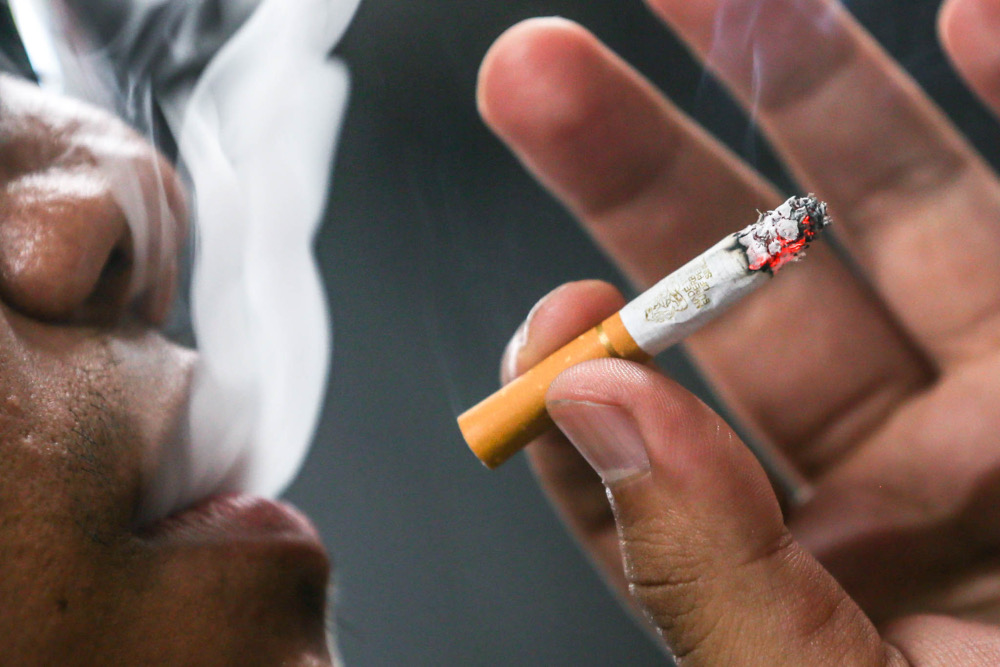KUALA LUMPUR, Feb 20 — The government’s announcement of a planned blanket ban on the sale of cigarettes and tobacco products to those born after 2005 is a seemingly “puritan” goal and could prove challenging if alternatives to said products are similarly outlawed, economists opined.
Last month, national news agency Bernama reported Health Minister Khairy Jamaluddin as saying that the government plans to ban tobacco products, including vape, for anyone born after 2005.
Like some other Western Pacific Regional Office (WPRO) countries, he said Malaysia hoped to pass the law this year, to spell the generational end-game to smoking.
Economist and Center for Market Education’s chief executive, Carmelo Ferlito, said that while Putrajaya has set an ambitious target, the reality on the ground and subsequent consequences are varying.
Ferlito pointed out policies that do not take into account the emergent social order are likely to produce a plethora of unintended consequences.
“The real point, according to me, is: What do we want to achieve? Banning nicotine consumption in all its forms smells Prohibition-like (in reference to the constitutional ban on the production, importation, transportation and sale of alcoholic beverages from 1920 to 1933 in the United States). It sounds very puritan,” Ferlito told Malay Mail.
“Tobacco bans fail to recognise that in the externalities analysis, two parts are involved. By ‘protecting’ non-smokers from smokers, we harm the smokers, depriving them of their right to pleasure. Therefore, a ban is discriminatory.
“Furthermore, we have evidence that prohibitions do not stop consumption. They just move consumers toward illegal alternatives, creating opportunities for a flourishing business for smugglers. Is this what we want? The actual target should be not consumption cessation, which is an utopia, but harm reduction.
“If we are talking about pleasure consumption like in the case of nicotine, it is much easier to convince consumers to switch to a less harmful product rather than convincing them to quit. Here the key is thus to promote less harmful initiatives, such as vaping, through incentives and in general an ecosystem conducive to innovation.”
He said that freedom of choice and respect for people’s pursuit of pleasure must be the cornerstones for an effective harm reduction strategy.
Ferlito listed three points: Use more rewards to incentivise behavioural change; focus on decreasing traditional products, while minimising restrictions and taxes related to ‘healthier’ alternatives (vaping, alcohol-free beer, etc); and concentrate on creating an environment that actuates innovation.
He added that a country that aims at being called a democracy should be respectful of the freedom of choice of individuals, with education and innovation at its core and not “punishment”.
“Punishment, like higher taxes, has been proved to be a failure as policy, and today, Malaysia has the highest illegal product market penetration in the world. Illegal products will flourish even further, not only for traditional cigarettes, but for vaping products too,” he said.
“This would be a loss of revenue for the government, which instead should proceed toward a different taxation in order to promote less harmful products.”
Ferlito added that harm reduction moves would only triumph if accompanied by respect for freedom of choice, which, in turn, implied the need to create conditions for the market to supply less harmful alternatives to consumers.
Better education, more awareness
One in five adults over the age of 15 smokes in Malaysia, with the National Health and Morbidity Survey (NHMS) 2019 estimating that there are approximately 4.7 million male smokers and more than 135,000 female smokers in the country.
Smoking prevalence is 45 per cent or higher across all age groups among men. For male teens aged 15 to 19, almost 25 per cent smoke.
Sunway University Business School economist Prof Yeah Kim Leng said that given Malaysia’s high national smoking prevalence of between 21.3 per cent and 40.5 per cent of male adults and a high proportion of below legal age smokers, the goal to lower smoking rates more quickly would be more challenging with a complete ban.
“Banning sales, limiting supply and curbing access by penalising those not subject to the ban are unlikely to be effective as such activities are typically hard to police and enforce. Such measures will lead to black market and clandestine activities that could spawn greater social ills,” said the former Bank Negara Malaysia Monetary Policy Committee (MPC) member.
“More efforts should be focused on curbing demand through sustained education and awareness programmes on the ill effects of smoking. Such measures will need to be reinforced with well-designed support and incentives programmes to quit smoking and adopt healthy lifestyles.”
The deputy president of the Malaysian Economic Association (MEA) added that while the tobacco industry will see less cigarette sales with corresponding reduction in industry revenue, tax collection and indirect effects on employment, income and wages, the ban may not result in lower consumption if circumvented, or if the sales are substituted with contraband cigarettes, which would result in revenue losses for both industry players and the government.
Uphill climb
Founder and CEO of The Galen Centre for Health and Social Policy, Azrul Mohd Khalib concurred that smoking is a problem among today’s youth, but added that it is still inherently a male issue.
Azrul foresees an uphill task for Putrajaya, in realising its ambitious goal of banning the sale of tobacco and smoking products to those born after 2005.
“It is going to be tough but making this first commitment is a critical step forward to addressing the problem of smoking in Malaysia, which has not seen much progress over the past five years.
“To see how tough it is going to be, compare Malaysia with New Zealand, which is leading this bold approach. The adult smoking prevalence in New Zealand is at 13.4 per cent, while Malaysia is at 21.3 per cent,” he said, adding that Singapore, which is also considering the same strategy, has about 10 per cent smoking prevalence.
By soldiering on with the goal, Azrul said that Malaysia has the potential to make an unprecedented, positive leap forward in tobacco control, drastically locking the gate to new smokers.
“It will bring those numbers down. It is an uphill climb, even for those countries, but for Malaysia it will be particularly steep,” he told Malay Mail.
Azrul said that several steps would have to move in parallel, chiefly emboldened by enforcement. This, he lamented, is where the problem lies.
“Unfortunately, based on our track record, this is where we are most likely to fail. For this policy to succeed, we must weed out corruption among law enforcement officials involved in curtailing the illegal market and reduce the flood of illicit tobacco into the country,” he added.
On government earnings, meanwhile, he did not see a drastic change in tax revenue in the first five years of the policy’s implementation.
“However, if there is a change in the behaviour of smokers, it will likely be a transition from smoking tobacco to smoking vape products. So the tax contribution will shift to vape and e-cigarettes,” Azrul said.
New laws for a fool-proof system?
When contacted by Malay Mail, lawyer Fahri Azzat said that new laws specifically addressing the ban would be needed.
“The government may have to fashion some new laws to take into account offences unique to the ban, but they do not have to create a specific one for those that abet, conspire or do so with common intention,” he said.
Fahri also saw little to no hope of the goal being achieved, pointing to weaknesses in the supporting institutions.
“Personally, we seem to want to ape the West without considering our local circumstances and dynamics,” he said.
“The ban is not going to stop the vaping or smoking culture. It will just drive it underground and the government will be deprived of taxes and have to spend to keep cigarettes/vapes out. The illegal gangs will now have another commodity to sell and make money from. The ban will not work here because our government bodies and enforcement institutions are corrupt.
“The question that should be posed to the minister is: What exactly does he hope to achieve from this from an economic, enforcement, corruption and societal standpoint?”
Lawyer Dinesh Muthal also concurred with Fahri.
“Actually there is already a law — the Food Act 1983, Control of Tobacco Product Regulations 2004. There is already a maximum penalty of RM10,000 or two years imprisonment if the sale of tobacco is done to those who are underage,” he said.
“Vape does not fall under this as it does not need tobacco but there is something called the Poison Act. So there are already provisions inside to ban it.
“Here, pretty much a law would be needed emphasising youngsters and probably they have to reinstate the selling and buying points in it.”



















